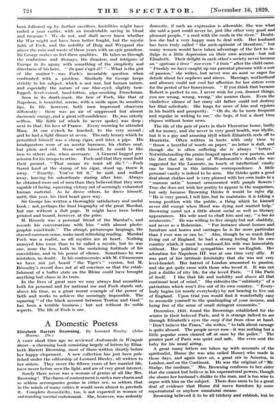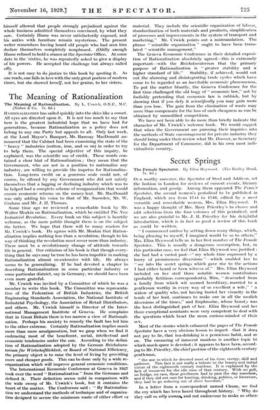A Domestic Poetess Elizabeth Barrett Browning. By Leonard Huxley. (John
Murray. 21s.) A VERY short time ago we reviewed Andromeda in Wimpole Street—a charming book consisting largely of letters by Eliza- beth Barrett Browning, most of them written shortly before her happy elopement. A new collection has just been pub- lished under the editorship of Leonard Huxley, all written to her sisters. They cover the fifteen years of her married life, have never before seen the light, and are of very great interest.
Surely there never was a woman of genius at all like Mrs. Browning! The charm of contentment is such a rare charm and so seldom accompanies genius in either sex, so seldom that in the minds of many critics it would seem almost to preclude it. Complete domesticity, too, is not expected in women of outstanding mental endowment. She, however, was ardently domestic, if such an expression is allowable. She was what she said a poet could never be, just like other very good and pleasant people, " a reed with the reeds in the river." Doubt- less she had a very happy man to deal with. Her husband has been truly called " the arch-optimist of literature," but many women would have taken advantage of the fact to in- dulge in a little depression on their own account—but not
Elizabeth. Their delight in each other's society never became an " egotisme a demx nor even " a trois " after the child came.
" Frankly we have caught up our parental pleasure with a sort of passion," she writes, but never was an aunt so eager for details about her nephews and nieces. Marriage, motherhood
and absence could not cool her affection for her sisters even for the period of her honeymoon. " If you think that because Robert is perfect to me, I never wish for you, dearest things, you are wrong, wrong, wrong," she assures them. Even the vindictive silence of her crazy old father could not destroy her filial solicitude. She longs for news of him and rejoices in his health and prosperity. " Oh do, do be more frequent and regular in writing to me," she, begs, if but a short time elapses without home news.
The life of the pair of poets in their Florentine home, badly off for money, and she never in very good health, was idyllic, but it is a gay and amusing idyll which Elizabeth reels off to Henrietta. Often written in haste with only time to " throw a heartful of words on paper," no letter is dull, and though she is often suffering she is always " better." Notwithstanding the praise heaped upon the new poetess, and the fact that at the time of Wordsworth's death she was suggested for the Laureate, no touch of intellectual vanity can be traced in this intimate correspondence. A little personal vanity is indeed to be seen. She thinks quite a good deal about clothes and is very pleased with her own looks in a " maroon satin " bonnet ornamented with purple flowers ! True she does not wish her poetry to appear in the magazines, but only because Browning thinks it would be infra dig. " He is very proud, I tell him, but he maintains it is taking a wrong position with the public, a thing which he himself never did except when Hood was dying and wanted help." Browning cared not a little about social as well as literary appearances. His wife used to chaff him and say, "4:1 bas les aristocrates." He was willing to live simply but not shabbily, and never as a Bohemian. " For instance about houses and furniture and horses and carriages he is far more particular than I ever was or can be." Also, though he so much liked living out of England, he had a strong feeling for his own country which, it must be confessed, his wife was lamentably without. Her political sympathies were un-English. Her adoration for Napoleon III. was at one time very silly. It was part of her intrinsic femininity that she was not very level-headed. Her hatred of London amounted to passion, and she got quite cross with those who loved it. It was not just a dislike of city life, for she loved Paris. " I like Paris of itself. I like that life and mobility and above all that continual beat of mind." She ridicules the "sublimity" of a patriotism which won't live out of its own country. " Every- body begins (or nearly everybody) by not bearing to live otrt of England. Upon trial you would find it wonderfully easy to reconcile yourself to the quadrupling of your income, and being free of the sense of small stringent economies."
December, 1851, found the Brownings established for the winter in their beloved Paris, and it is strange indeed to see through Elizabeth's eyes the coup d' dal from close at hand. " Don't believe the Times," she writes, " to talk about carnage
• is quite absurd. The people never rose—it was nothing but a little popular scum cleared off at once by the police." The greater part of Paris was quiet and safe. She even sent the baby for his usual airing.
A great many letters are taken up with accounts of the spiritualist, Hume (he was also called Home) who made in those days, and again later on, a great stir in America, in London, and on the Continent. He was the original of "Mr. Sludge, the medium." Mrs. Browning confesses to her sister that she cannot but believe in his supernatural powers, though she shares her husband's dislike to the man, and is too wise to argue with him on the subject. There does seem to be a great deal of evidence that Hume, did move furniture by some supernatural or anyhow unnatural means.
Browning believed it to be all trickery and rubbish, but he
himself allowed that people strongly prejudiced against the whole business admitted themselves convinced, by what they saw. Certainly Hume was never satisfactorily exposed, and his antics with furniture remain mysterious. The present writer remembers having heard old people who had seen him declare themselves completely nonplussed. (Oddly enough Hume refused to hold a seance at. the Spectator Office. At some date in the 'sixties, he was repeatedly asked to give a display of his powers. He accepted the challenge but always called off).
It is not easy to do justice to this book by quoting it. As one reads, one falls in love with the only great poetess of modern times, but she showed herself, not her genius, to her sisters.









































 Previous page
Previous page